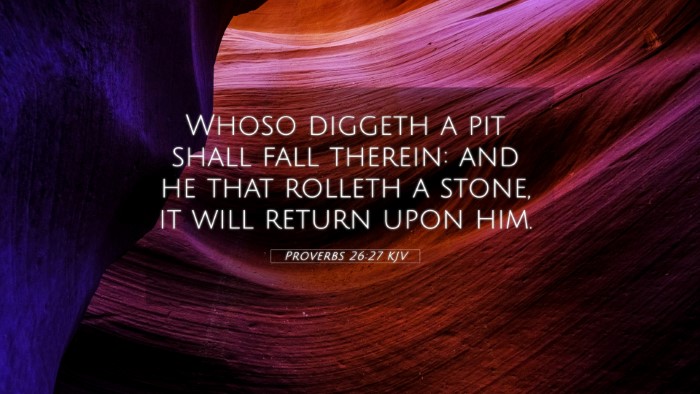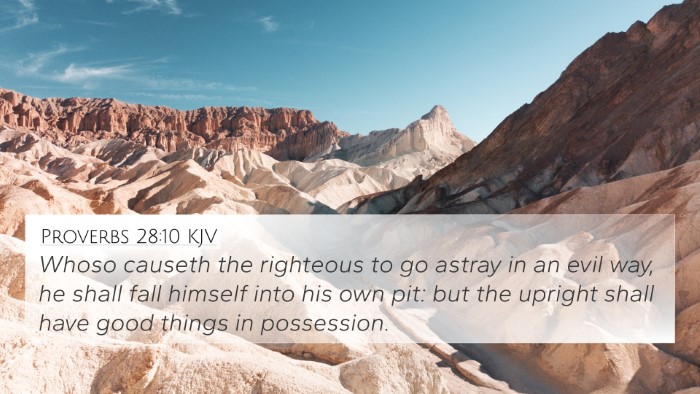Understanding Proverbs 26:27
Proverbs 26:27 states: "Whoso diggeth a pit shall fall therein: and he that rolleth a stone, it will return upon him." This verse serves as a profound reminder of the principle of divine justice and the inevitable consequences of one's actions.
Meaning and Interpretation
This wisdom verse emphasizes that those who engage in mischievous or harmful actions against others are likely to face the repercussions of their own deeds. The imagery of digging a pit and rolling a stone illustrates the self-destructive nature of malicious intent. Public domain commentaries shed light on the deeper meanings and implications of this scripture:
- Matthew Henry: Henry expounds that the imagery used in this proverb illustrates a moral truth; those who seek to entrap others inevitably become victims of their own schemes. This reflects a universal law where evil intentions lead to self-inflicted harm.
- Albert Barnes: Barnes emphasizes the concept of reaping what one sows. He notes that the verse serves as a warning against dishonesty and treachery, assuring the reader that there will be consequences for wrongful actions.
- Adam Clarke: Clarke highlights the inevitable nature of the results of wickedness and suggests that the verse reflects an ancient and enduring principle seen throughout scripture. It shows that God’s moral order prevails in the world.
Related Cross References
When exploring Proverbs 26:27, several other Bible verses can be considered for comparative analysis and thematic connections:
- Galatians 6:7: "Be not deceived; God is not mocked: for whatsoever a man soweth, that shall he also reap."
- Job 4:8: "Even as I have seen, they that plow iniquity, and sow wickedness, reap the same."
- Psalms 7:15: "He made a pit, and digged it, and is fallen into the ditch which he made."
- Proverbs 11:5: "The righteousness of the perfect shall direct his way: but the wicked shall fall by his own wickedness."
- Proverbs 28:10: "Whoso causeth the righteous to go astray in an evil way, he shall fall himself into his own pit: but the upright shall have good things in possession."
- Ecclesiastes 10:8: "He that diggeth a pit shall fall into it; and whoso breaketh an hedge, a serpent shall bite him."
- Sarptic 5:1: "Set not your heart upon your goods; and say not, I have enough for my life."
Thematic Connections
Proverbs 26:27 not only stands alone but evokes strong connections with various other scriptures that articulate similar themes of justice, morality, and consequences of actions:
- Emphasis on Justice: Many scriptures throughout the Bible underscore the nature of divine justice, illustrating that evil deeds often bring about suffering for the doer.
- Human Nature and Temptation: This verse connects to themes within the New Testament that discuss human fallibility, such as the teachings of Jesus regarding temptations and the moral choices individuals face.
- Consequences: The ramifications of one’s choices permeate biblical teachings, indicating that actions, whether good or evil, have far-reaching implications.
Practical Application
Integrating the lessons from Proverbs 26:27 into daily life calls for vigilance in our actions and decisions. As one reflects on the idea of 'what is sown will be reaped', individuals are reminded to act justly and with integrity:
- Self-Reflection: Regularly assess one's motives behind actions to ensure they align with righteous principles.
- Accountability: Understanding that choices have consequences fosters a sense of responsibility toward oneself and others.
- Humility: Acknowledging one’s fallibility and the potential for missteps encourages a posture of humility and a desire for growth.
Cross-Referencing Bible Study Tools
To explore Proverbs 26:27 and other interconnected Bible verses thoroughly, utilizing various resources can enhance understanding:
- Bible Concordance: Use a concordance to locate verses related to specific words or themes.
- Bible Cross-reference Guide: A guide can help trace thematic connections and provide context.
- Cross-reference Bible study methods: Techniques such as thematic studies can uncover the recurrences of ideas across texts.
- Bible Reference Resources: These offer insights into character studies, historical contexts, and theological reflections.
Conclusion
Proverbs 26:27 serves as a timeless reflection on the implications of one's actions. The insights from public domain commentaries combined with cross-referenced verses enhance its meaning, guiding believers to cultivate integrity in thought and deed. By understanding these connections through comparative verse analysis, one can deepen their appreciation of the biblical text as a cohesive whole.









